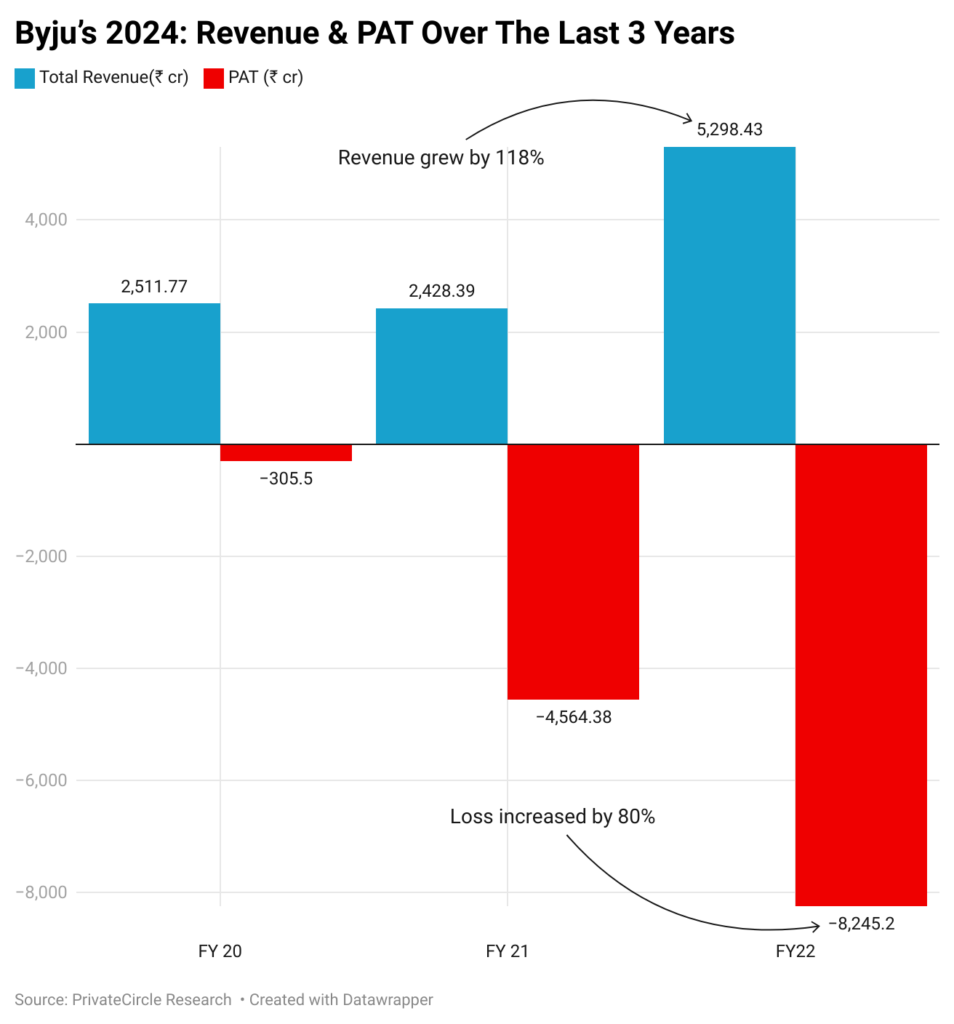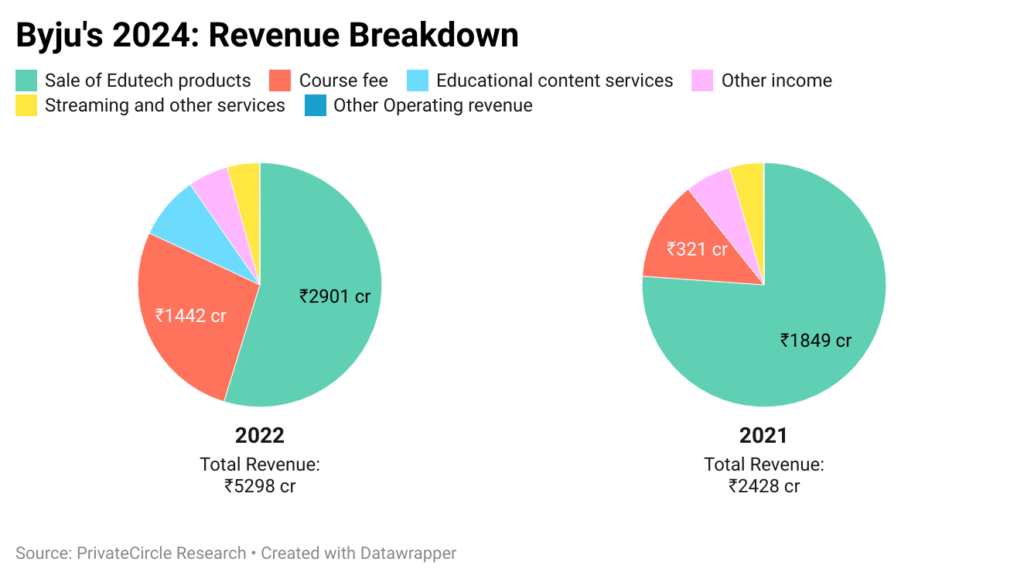The Rise and Fall of Byju’s: How a $22 Billion Valuation Crumbled to $2 Billion

Byju Raveendran’s rise from a service engineer to a leading figure in education started in 2003 with an unexpected opportunity in his hometown of Kerala. His passion for teaching took root when he began helping his friends prepare for the MBA entrance exam, CAT. This eventually led him to establish Byju’s in 2006, initially focusing on CAT exam coaching. As the company grew, it broadened its offerings to include courses for undergraduate students. It ventured into the school curriculum, utilizing interactive videos and real-world examples to simplify complex topics.
The launch of Byju’s learning app in 2015 marked a turning point, drawing global attention and transforming the company into a unicorn by 2019. High-profile endorsements from celebrities like Shah Rukh Khan and Virat Kohli further propelled Byju’s success, leading to an impressive valuation of $22 billion and solidifying its status as the world’s most valuable ed-tech company.
During the Covid-19 pandemic, when schools and universities closed, the company spent a lot of money to grow quickly by buying several edtech startups in India and the US. However, as students returned to classrooms, the company’s growth slowed. On top of that, it has been dealing with a long legal dispute, which seems to be getting worse.
Expanding Through Acquisitions and Growth Strategies
Byju expanded its offerings by acquiring companies like WhiteHat Jr., an online coding platform for kids, and Aakash Educational Services, a top test preparation company in India. These acquisitions helped Byju diversify its products and enter new markets.
Byju’s rapid growth and high valuation have been fueled by its bold marketing strategies, dedication to innovation, and focus on quality content. These factors have attracted substantial investment, making it one of the most valuable edtech startups in the world.
Businesses Acquired by Byju’s
Great Learning Pvt. Ltd.
In July 2021, BYJU bought Great Learning Pvt. Ltd. for $600 million. This company is a top player in professional and higher education, having provided over 60 million hours of learning to 1.5 million students across more than 170 countries.
Epic!
Also in July 2021, BYJU acquired Epic! for $500 million. Epic! is the leading digital reading platform for kids aged 12 and under, offering a vast collection of over 40,000 books, audiobooks, and videos from more than 250 publishers.
Aakash Educational Services Ltd.
In April 2021, BYJU took over Aakash Educational Services Ltd. (AESL), a well-established test preparation company with over 33 years of experience and more than 215 centres across India. AESL is known for helping students prepare for medical and engineering entrance exams, school board exams, and other foundational tests.
WhiteHat Jr.
In July 2020, BYJU purchased WhiteHat Jr. for $300 million. WhiteHat Jr. teaches students coding through live, interactive online classes.
Osmo
In January 2019, BYJU bought Osmo, a US-based company, for $120 million. Osmo is famous for creating educational games that blend physical and digital play, aimed at children aged 3-8 years. This acquisition helped BYJU launch its Disney. BYJU’S Early Learn program.
TutorVista and Edurite
In July 2017, BYJU acquired TutorVista and Edurite from Pearson. TutorVista is one of the largest online tutoring services, primarily serving school and college students in the United States.
Financial Analysis – Byju’s
Edtech giant Byju has finally released its audited financial statements for FY22, revealing a significant increase in revenue alongside a sharp rise in losses. The company’s revenue from operations more than doubled, growing 2.2 times during the period, but its losses also ballooned to Rs 8,245 crore in FY22.
Before diving into the details of expenses and losses, let’s first look at Byju’s earnings. According to its consolidated financial statements, accessed by Entrackr, Byju’s revenue from operations soared to Rs 5,015 crore in FY22, up from Rs 2,280 crore in FY21. However, the company has not yet disclosed its FY23 results to the Registrar of Companies (RoC).
The consolidated financial statement includes the performance of Byju’s 12 main subsidiary companies, such as Aakash Institute, WhiteHat Jr, Byju’s K3, Toppr, Epic, Great Learning, and others.
Focusing on revenue, the sale of educational products—like video lectures stored on SD cards and tablets—accounted for 57% of the total revenue, increasing by 56.8% to Rs 2,901 crore in FY22.
The remaining revenue came from course fees, streaming services, and educational content offerings. Additionally, Byju reported a non-operating income of Rs 283 crore, mainly from interest and gains on the sale of current investments, bringing its total income to Rs 5,298 crore in FY22.
On the expense side, production costs made up 30% of the total expenditure. Although the company did not provide a detailed breakdown, these costs likely include expenses related to recording lectures, streaming, advertising, marketing, and other associated activities. This expenditure rose by 84.1% to Rs 4,143 crore in FY22.
Costs related to procuring study materials and employee benefits also surged by 54.3% and 82.8%, respectively, during FY22. Byju’s overall expenses, including teacher commissions, travel, legal, IT, and other overheads, increased by 94.51%, reaching Rs 13,668 crore in FY22, up from Rs 7,027 crore in FY21.


The sharp increase in Byju’s overall costs led to an 80.65% rise in its losses, which reached Rs 8,245 crore in FY22, up from Rs 4,564 crore in FY21. The company’s Return on Capital Employed (ROCE) was 23.7%, while its EBITDA margin stood at a negative 126.1%. On a per-unit basis, Byju’s spent Rs 2.73 to earn a single rupee in FY22.
As of March 2022, Byju’s had total current assets worth Rs 13,780 crore, which included cash and bank balances amounting to Rs 5,067 crore.
Nitin Golani, Byju’s CFO, acknowledged the company’s financial growth but also pointed out challenges: “While we are happy that our total income has grown 2.2X, we are also aware of our underperforming businesses like Whitehat Jr and OSMO, which contribute to 45% of the losses,” he said in a statement.
However, there are concerns about the company’s ongoing losses and its $1.2 billion term loan facility. The company’s auditor has flagged a material uncertainty that could significantly impact Byju’s ability to continue operating as a going concern.

Image Source: Entrackr
The Downfall of Byju’s
Once a leading name in the online education industry, Byju’s began facing significant challenges in 2023. The company’s troubles started as the online education market began to shift, with demand declining and competition increasing. These market changes were further compounded by legal issues that weakened Byju’s standing.
In April 2023, Byju’s was hit hard by an investigation from the Enforcement Directorate (ED) for potential violations of the Foreign Exchange Management Act (FEMA). The company was notified of a ₹9,362.35 crore FEMA violation, adding to its financial woes. Meanwhile, legal battles escalated as Redwood, a prominent international lender, sued Byju’s for defaulting on a $1.2 billion loan and failing to make interest payments.
These legal issues had a ripple effect across the company. Several high-profile figures, including board members, left, and Deloitte resigned as Byju’s financial auditor, increasing the company’s instability. In response to its financial struggles, Byju’s resorted to layoffs, but even this drastic measure couldn’t solve its ongoing payroll issues, further damaging the reputation of its founder and CEO, Byju Raveendran.
In November 2023, a significant US court ruling favored the lenders, intensifying pressure on Byju’s. The court supported the actions of the lender consortium, which included the resignation of Riju Raveendran from the board, marking another severe setback for the company.
With investor confidence waning and lenders tightening their grip, Byju’s was forced to lower its valuation. The company’s attempt to secure $200 million in financing against a reduced valuation of $250 million only added to its challenges. Ultimately, Byju’s found itself trapped in a complex web of legal battles, financial difficulties, and internal disruptions, casting a shadow over its once-bright future in the online education sector.
Sharp Valuation Reductions
Byju’s has recently faced significant cuts in its valuation. BlackRock, a global investment management firm that owns less than 1% of Byju’s, reduced the company’s valuation to $1 billion. This is a sharp decline from the $22 billion peak the company reached in early 2022.
In November 2023, tech investor Prosus also marked down the value of its stake in Byju’s. As a result, the company’s valuation dropped to under $3 billion, an 86% decrease from its previous valuation of $22 billion.
Lessons Learned from Byju’s Downfall
Byju’s decline offers valuable lessons for companies in any industry. It underscores the need for thorough market research, strategic planning, and ongoing innovation to stay ahead in a rapidly evolving market. The company’s struggles highlight that success is not guaranteed and that continuous improvement and adaptation to customer needs are essential for maintaining relevance.
As Byju’s faces a tough period with calls for leadership changes, including the potential removal of CEO Byju Raveendran, it reflects broader concerns about the company’s valuation. Some investors suggest that the company’s worth could be between $1 billion and $3 billion, a significant drop from its previous high.
To address these challenges, Byju’s is focusing on raising $200 million through a rights issue of shares. This capital infusion is seen as crucial for a turnaround and has received backing from several shareholders. The success of this fundraising effort will be key in determining Byju’s ability to recover and regain investor trust.


